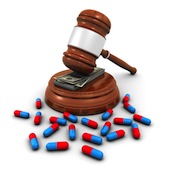
Xiulu Ruan and Shakeel Kahn had been found by lower juries to have been ...
continue reading...
Xiulu Ruan and Shakeel Kahn had been found by lower juries to have been ...
continue reading...
If you recall, the Supreme Court overwhelmingly ruled in favor of Bristol-Myers Squibb by 8-1 in June. At question was whether plaintiffs from states other than California could join ...
continue reading...On June 24, 2013 the United States Supreme Court decided the case Mutual Pharmaceutical v. Bartlett, and held that the manufacturer of a generic version of a drug could not be held liable for injuries cause by the defective design of that drug. In 2011, the Court had also held that generic drug manufacturers could not be held liable for defective (incomplete) warning labels accompanying their products. The end result is that manufacturers of generic drugs are almost completely protected ...
continue reading...
According to the consumer ...
continue reading...